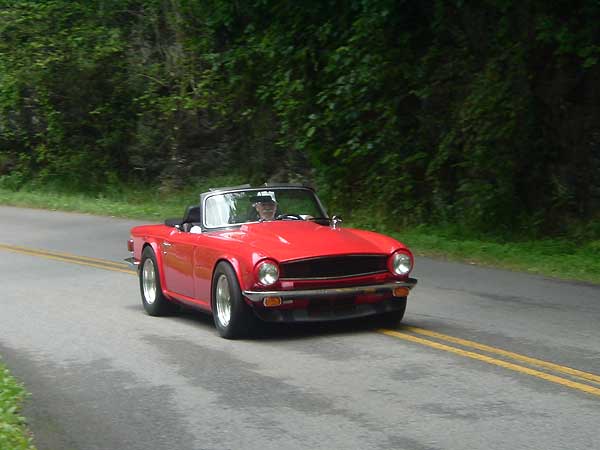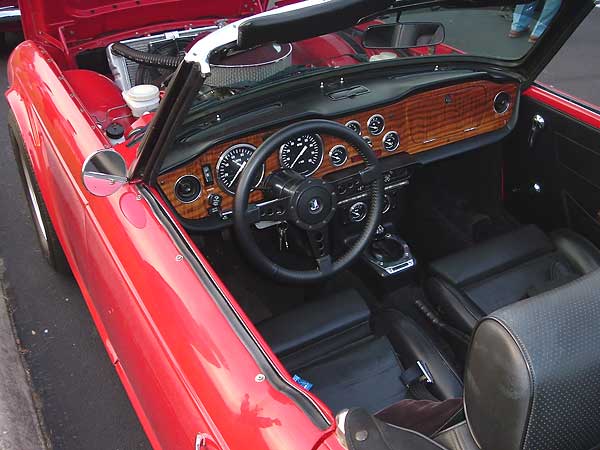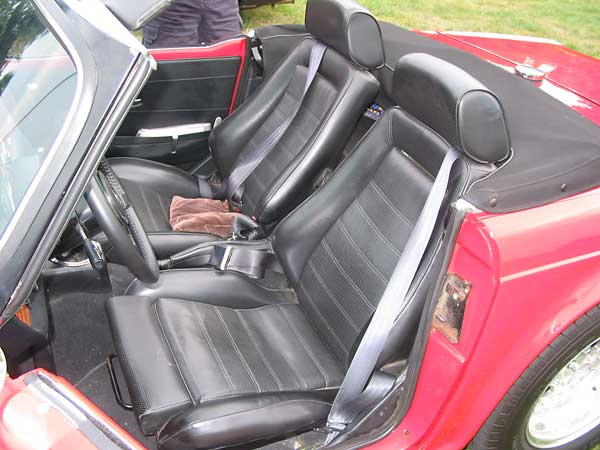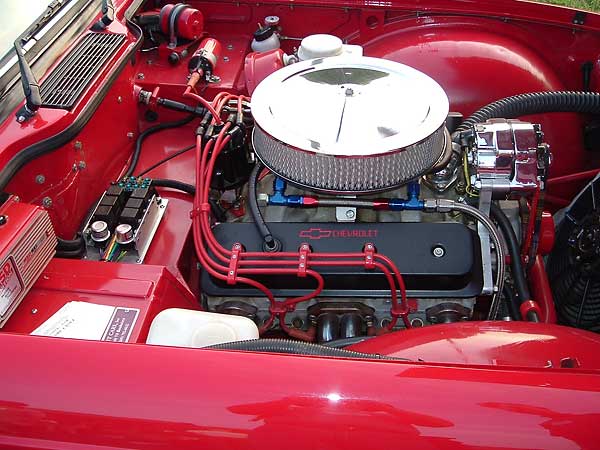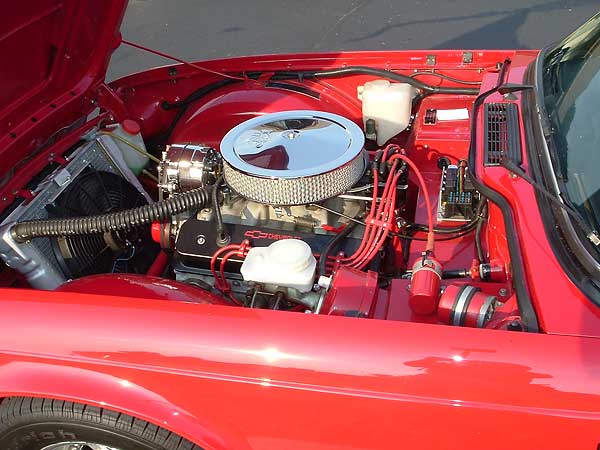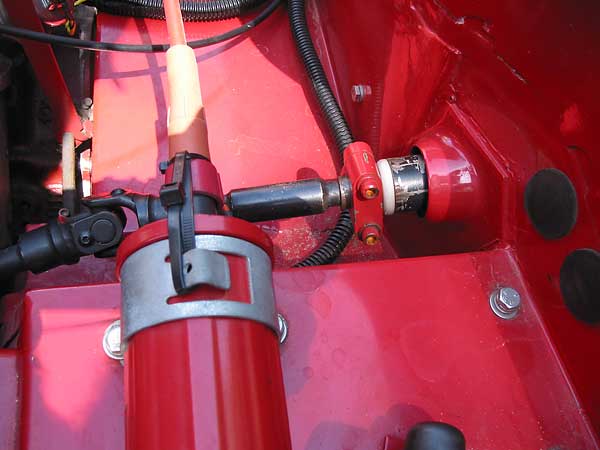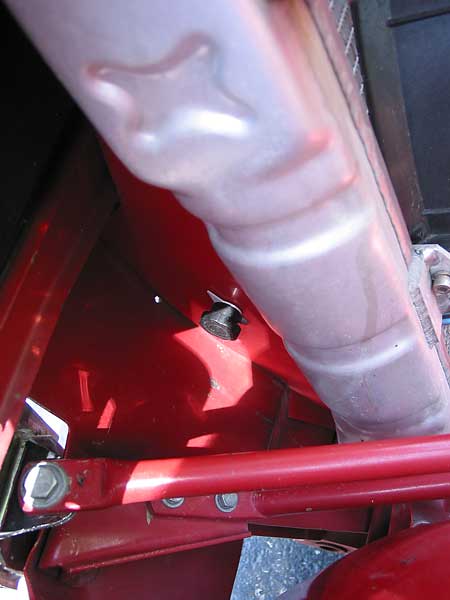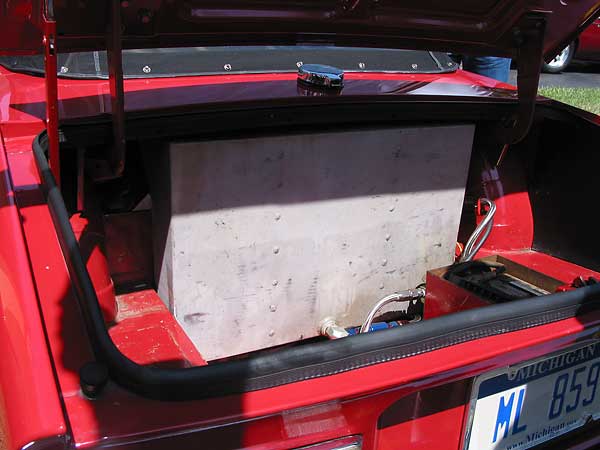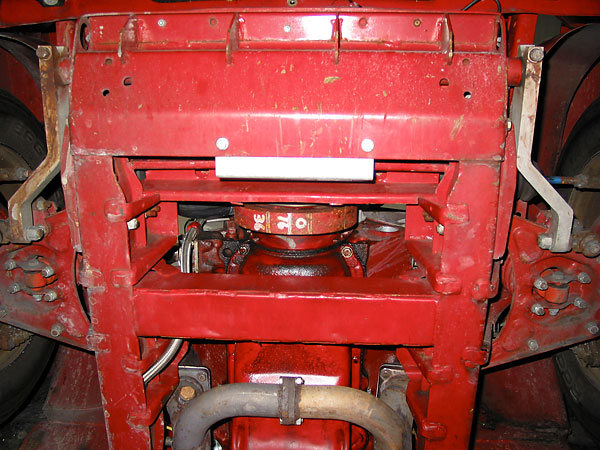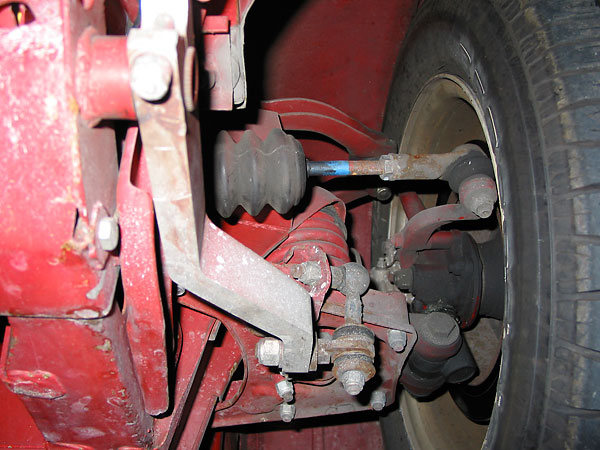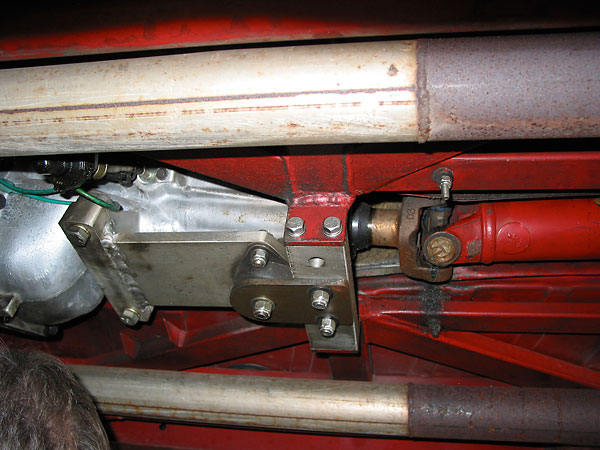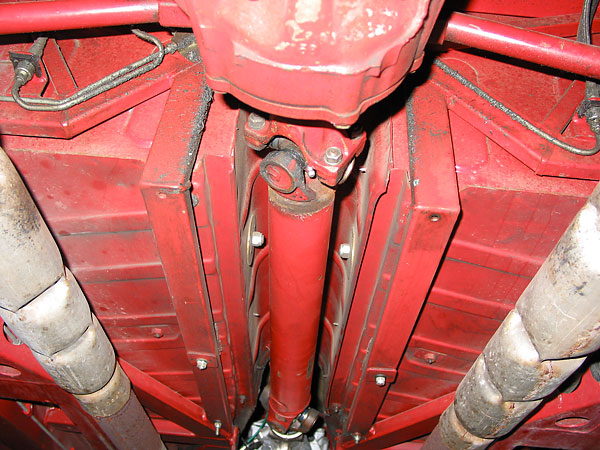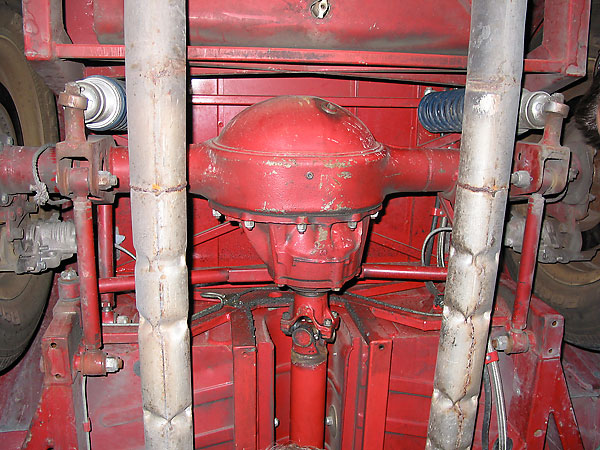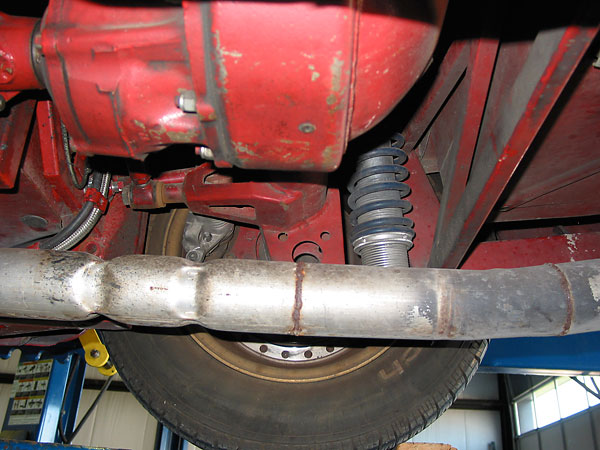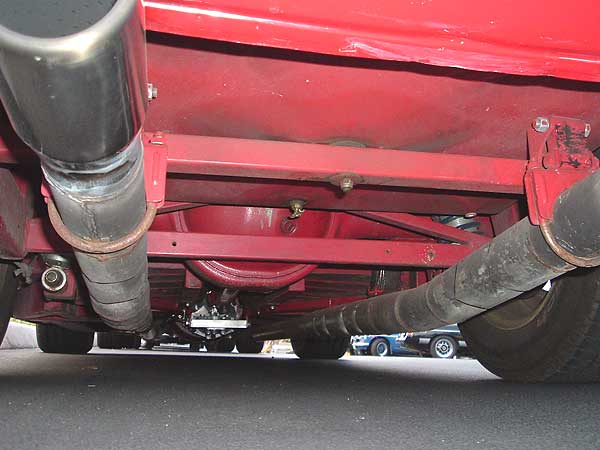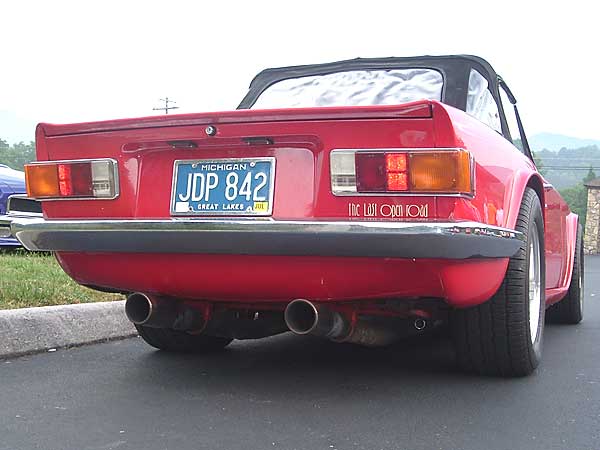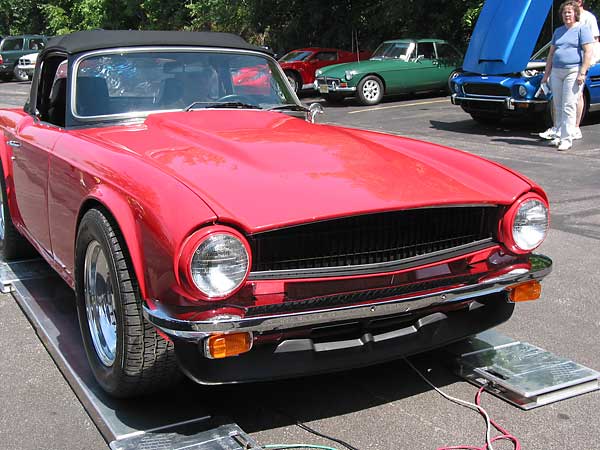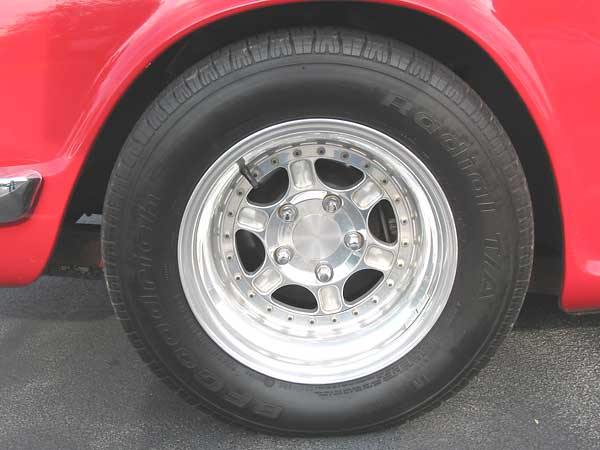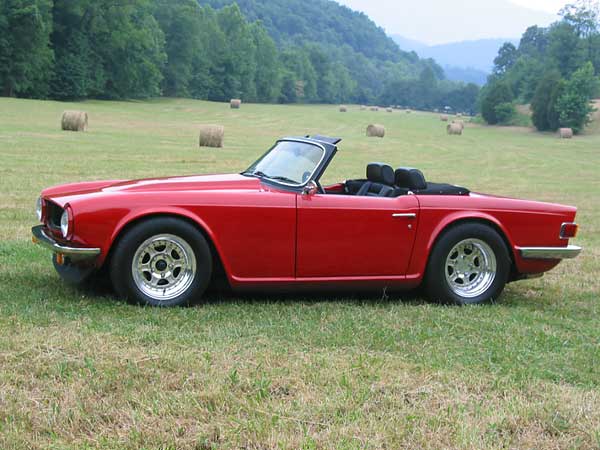
Ted Lathrop's Chevy 350 Powered 1976 TR6, by Fast Cars Inc.
(originally published in British V8 Newsletter, Volume 9 Issue 2)
By: Ted Lathrop
City: Wayland, MI
Model: 1976 Triumph TR-6
Engine: Chevy 350
How It Was Done
| Engine: | 1972 Chevy 350 block, with 1996 Corvette aluminum heads. Bored 0.030" over. Camshaft
from Competition Cams (0.454" lift, and 218 degrees) with hydraulic lifters. The Corvette
heads were chosen because they had large valves, but rather small ports. This combination
provides power and torque in the lower RPM range, as compared to heads with larger ports.
Competition Cams roller rockers were used. The block was used because I just happened to
have it laying around the shop. |
| Clutch/Flywheel: | the clutch is a 10.5 inch unit from Centerforce. A McCleod hydraulic throw-out bearing is
used along with the stock TR6 master cylinder. The bellhousing is a hydraulically formed steel
piece from Lakewood. The steel plate provided with the bell housing was replaced with an owner
fabricated aluminum piece for weight reduction.
|
| Transmission: | BW T5 five speed from a 1982 V8 Camaro. Fifth gear was changed to a 0.80:1 ratio. With a 3.5
rear axle, 0.80 works out perfectly for highway use. |
| Exhaust: | commercial stainless steel headers were purchased and extensively modified to fit. Corvette
side-pipe mufflers were used, running straight under the car, and out the back. These produce a
very pleasing, very mellow sound - no need for a stereo system! |
| Driveshaft: | a GM front section was mated to a Ford rear section, and the assembly was then balanced. |
| Frame: | the Frame is owner built. Portions of the original frame were used, such as the front
suspension components and the side rails (although modified), but the majority of the frame
is of my own design. The rear of the frame was built to accommodate a four-link suspension
system and a Ford 9-inch axle. As you can see from the photo, the side rails were extensively
modified and strengthened. The stock TR6 frame is rather flimsy, and flexes quite a bit. This
frame design significantly reduces the flexing. |
| Rear End: | a Ford 9-inch unit was narrowed, and installed with 3.5 gearing. New axles were installed, with
a five-bolt Chevy lug pattern. Combined with the tire size and transmission ratios, the 3.5 gearing
works out just about perfect. Cruising at 70, the engine is turning 2480 RPM. At this RPM, there is
plenty of power for passing without having to downshift into fourth. |
| Front Suspension: | the lower A-arm mounts were modified to move the pivot point inwards 3/8 inch to provide improved
camber setting. The upper bushings were owner made of Teflon, lower bushings are Delrin. After
several years of use, they still show no signs of wear. The shocks are Koni units. The front sway
bar was taken from a sprint car, using owner fabricated aluminum control arms. |
| Rear Suspension: | Carrera coil-overs on a four link system. |
| Brakes: | Corvette disc brakes on all four wheels, front vertical link modified to accept Chevy spindles
and hubs. |
| Wheels/Tires: | 245/60/15 rear, 225/60/15 front. Lightspeed 3-piece wheels from Taylor wheel company, 8 inch in rear,
7 inch in front. |
| Cooling: | Griffin aluminum cross-flow radiator, electric fan in a puller configuration. Front of radiator is
fully shrouded, so ALL air passes through the radiator. Hood scoop is vented at rear. No cooling problems
at all. |
| Interior: | stock gauges except for the fuel gauge, which is a BMW gauge with a TR6 face. The TR6 gauge would not
read right with the BMW sending unit installed in the custom made fuel tank. Stock mechanical tach retained
with an owner-built adapter to mate it to a mechanical tach drive Chevy distributer. Leather seats are
from a BMW 318, year unknown. Dash was a gift from my wife Judy, and is a laminated dash with California
fiddle back walnut veneer, made by Keller and Associates. Steering column is a tilt unit from an early
Chevy van (no ignition locking mechanism). Many hours of custom work went into modifying the column and
fabricating adapters to fit the TR6. |
| Body: | three piece rear bumper welded into one-piece. Ugly bumper over-riders eliminated front and rear, and holes
welded shut. Side marker lights removed and hole filled. Unused holes under hood filled. Canvas top. Body
area behind the seats and in the trunk was modified to allow room for the four-link suspension set-up.
Custom aluminum fuel tank was made to fit the odd space left over. |
| Electrical: | Ron Francis Wire Works fuse block and wiring harness mated to stock wiring. Fuse block located on shelf where
battery was originally located. Battery relocated to trunk. |
| About the owner: | Ted has spent a lifetime involved in the building and racing of circle track stock cars. This reflects that
lifetime of experience. He is now "semi" retired and works out of his home shop in Michigan. He is currently
developing a coil-over front suspension set-up for the MGB, and manufacturers a complete 8-inch Ford rear axle
for the MGB as well. If you are interested in a BritishV8 conversion but don't feel you have the time or the talent
for it, contact Ted and let him build it for you. See his ad on the inside front cover of this newsletter.
|
